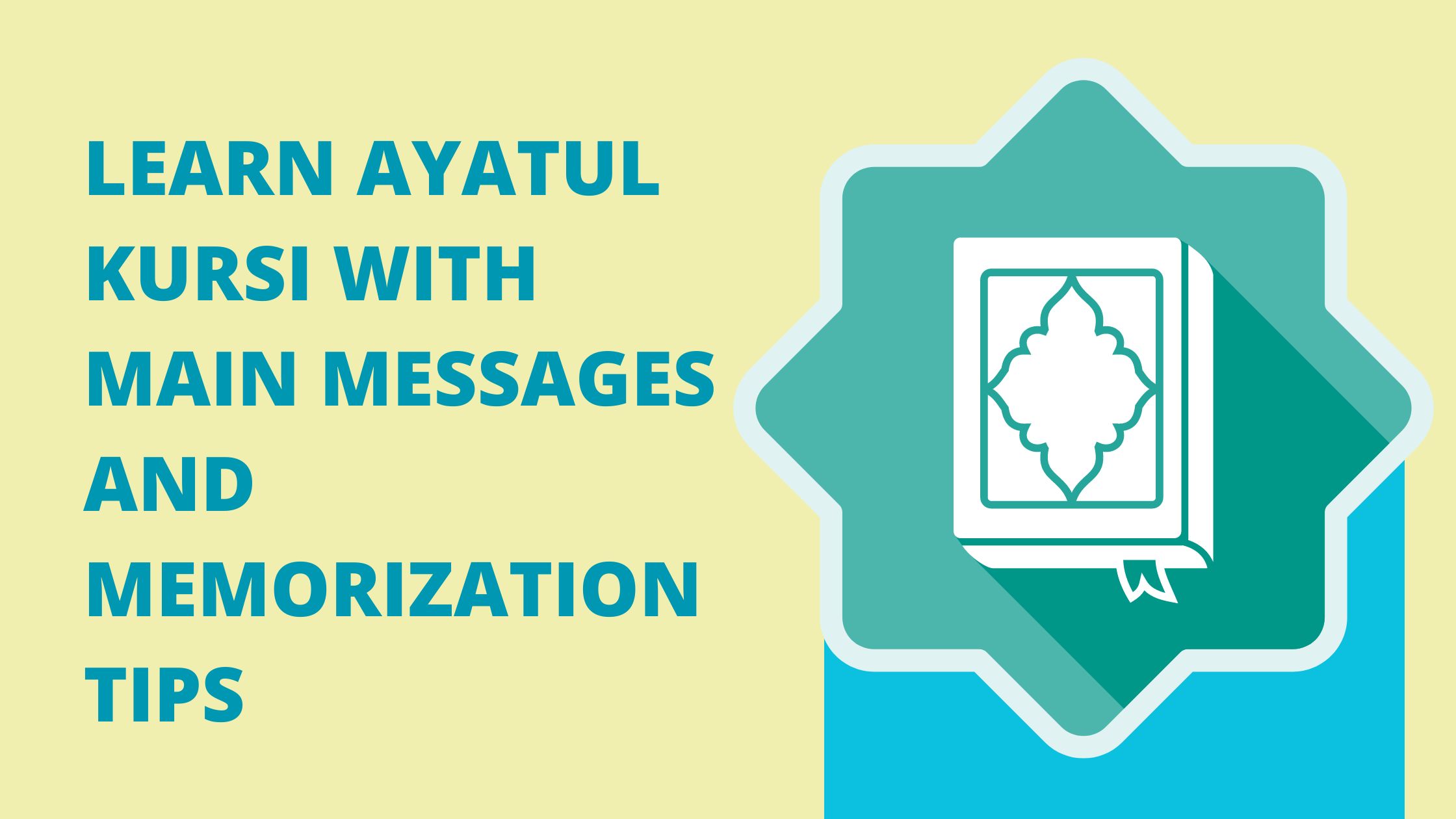Ayatul Kursi, also known as the “Throne Verse,” is one of the most revered verses in the Quran, found in Surah Al-Baqarah (2:255).
This powerful verse emphasizes Allah’s greatness, sovereignty, and omnipotence, making it one of the cornerstones of Islamic faith and spirituality.
Recited by millions of Muslims daily, Ayatul Kursi serves as a source of immense spiritual strength, providing comfort and protection to those who recite it regularly.
In this comprehensive guide, we will delve into the significance of Ayatul Kursi, explore the profound lessons it imparts, and provide practical steps for learning, memorizing, and teaching this powerful verse.
Through this guide, we aim to help you fully integrate the recitation and reflection of Ayatul Kursi into your daily spiritual practice.
Table of Contents
What is Ayatul kursi?
Ayatul Kursi is a verse from the Quran, specifically verse 255 of Surah Al-Baqarah. It is one of the most well-known and often recited verses in the Islamic tradition.
The verse highlights the greatness and sovereignty of Allah, emphasizing His eternal nature, omnipotence, and the fact that He is the sustainer of all that exists.
It begins with “Allah! There is no deity except Him, the Ever-Living, the Sustainer of existence,” and continues to describe His attributes, including His knowledge, which encompasses everything in the heavens and the earth.
Ayatul Kursi is highly regarded for its protective qualities and spiritual benefits. Muslims often recite it for protection against evil, to seek blessings, and to find comfort and peace.
It is commonly recited during prayers, before sleeping, and in various daily activities as a means of invoking divine protection and mercy. The verse is considered a source of immense spiritual strength and a reminder of the omnipresence and omnipotence of Allah.
What are the Lessons in Ayatul Kursi?
Ayat al-Kursi, found in Surah Al-Baqarah (2:255) of the Quran, holds a special significance in Islamic spirituality and theology. Often referred to as the “Throne Verse,” it is revered by Muslims worldwide for its profound meaning and divine attributes attributed to Allah.
The verse is recited in various Islamic rituals and is considered a powerful invocation for protection and blessings.
Here’s a more elaborate explanation of the lessons derived from Ayat al-Kursi:
1. Faith and Oneness of God (Tawheed)
Ayat al-Kursi begins with a profound declaration of faith, asserting the absolute oneness of Allah and emphasizing that there is no deity worthy of worship except Him.
This fundamental concept of Tawheed is the cornerstone of Islamic belief, underscoring the monotheistic nature of Islam.
2. Divine Attributes
The verse elaborates on various divine attributes of Allah, providing a comprehensive insight into His nature. From being the Living and the Sustainer to His all-encompassing knowledge and sovereignty, Ayat al-Kursi serves as a practical study of the names and qualities exclusive to Allah.
3. Belief in Allah’s Decree and the Unseen
Ayat al-Kursi instills a deep sense of faith in Allah’s divine decree and control over the unseen aspects of existence.
It reaffirms that everything is within His grasp and that no one can intervene in any matter except with His permission, thereby emphasizing trust and reliance on Allah’s wisdom and plan.
4. Polytheism’s Denunciation
By affirming the unique divine attributes of Allah, Ayat al-Kursi implicitly refutes any notion of polytheism or the existence of other deities. It underscores the incomparable greatness and sovereignty of Allah, highlighting that there is no equal or rival to Him.
5. All-Encompassing Ownership
The verse asserts that Allah possesses everything in the heavens and the earth, establishing Him as the sole Creator and Owner of the universe. That emphasizes the concept of divine ownership, where everything belongs to Allah and is subject to His will and decree.
6. Supreme Sovereignty
Ayat al-Kursi highlights the perfect sovereignty of Allah, surpassing mere kingship or rulership.
It underscores His absolute authority and control over all affairs, affirming that no one can intercede with Him except by His permission, thereby showcasing His unmatched power and dominion.
7. All-Knowing and All-Aware
The verse affirms that Allah is fully knowledgeable and aware of all things, encompassing the past, present, and future. That underscores His omniscience and omnipotence, reassuring believers that nothing escapes His knowledge and that He is fully aware of their circumstances and needs.
8. Denial of Universal Intercession
Ayat al-Kursi firmly denies the possibility of universal intercession without Allah’s permission, thereby refuting any belief in intermediaries or intercessors who can influence divine decisions independently.
That underscores the direct relationship between humans and their Creator, without the need for intermediaries.
9. Limitations of Human Knowledge
By highlighting that human knowledge is limited and subject to Allah’s will, Ayat al-Kursi humbles believers and reminds them of their dependence on Allah for guidance and understanding.
It emphasizes that true knowledge and wisdom come from Allah alone and that humans can only comprehend what He allows them to know.
10. Magnificence of the Creator and His Creation
Ultimately, Ayat al-Kursi serves to magnify the greatness of the Creator and His creation. It underscores the vastness of Allah’s throne, symbolizing His infinite power and majesty while also highlighting the intricacies and wonders of His creation, which reflect His divine wisdom and creativity.
11. Confirmation of Allah’s Knowledge, Power, and Perfection
Throughout Ayat al-Kursi, there is a consistent reaffirmation of Allah’s knowledge, power, and perfection.
From His ability to preserve and protect His creation to His unmatched sovereignty and magnificence, the verse serves as a testament to the limitless attributes of Allah, establishing Him as the Most High, the Great.
In summary, Ayat al-Kursi encompasses profound lessons that deepen believers’ understanding of faith, reinforce their relationship with Allah, and affirm His unmatched sovereignty and greatness.
It serves as a guiding light for believers, reminding them of the fundamental principles of Islam and inspiring them to trust in Allah’s wisdom and plan.
What is the Main Message in Ayatul Kursi?
The main message of Ayat al-Kursi revolves around the affirmation of the absolute Oneness (Tawheed), Sovereignty, Magnificence, and authority of Allah over all creation.
Ayat al-Kursi begins with a declaration of faith, asserting that there is no deity worthy of worship except Allah. This declaration serves as the cornerstone of Islamic belief, affirming the monotheistic nature of Islam and emphasizing the exclusive worship of Allah alone.
The verse further elaborates on the divine attributes of Allah, describing Him as the Living, the Sustainer of existence, and the Everlasting. It highlights Allah’s eternal nature and continuous presence in the universe, underscoring His unmatched power and authority.
Moreover, Ayat al-Kursi emphasizes Allah’s all-encompassing knowledge, encompassing all things in the heavens and the earth. It affirms that nothing is hidden from Allah’s sight, and He is fully aware of all that transpires in the universe, including the past, present, and future.
One of the central messages of Ayat al-Kursi is the affirmation of Allah’s supreme sovereignty and authority. It asserts that no one can intercede with Him except by His permission, highlighting His absolute control over all affairs.
This notion of divine sovereignty reinforces the concept of divine decree and underscores the belief that Allah alone holds the power to decree and determine the course of events.
Overall, the main message of Ayat al-Kursi is to instill a deep sense of faith and reliance on Allah. It calls upon believers to recognize and acknowledge the unmatched greatness and authority of Allah, to worship Him alone, and to place their trust and dependence on His mercy and guidance.
Through recitation and reflection on Ayat al-Kursi, Muslims seek spiritual strength, protection, and guidance in their lives, reaffirming their devotion to Allah and His divine attributes.
How to Learn to Read Ayatul Kursi?
Learning to read Ayatul Kursi can be a spiritually enriching experience. To learn Ayatul Kursi, start with understanding its significance, then learn the Arabic text through transliteration of Arabic script.
Listen to recitations for pronunciation, repeat daily, and seek guidance for improvement, reflecting on its meaning for spiritual enrichment.
Here’s a step-by-step guide to help read Ayatul Kursi:
1. Understand the Importance
Ayatul Kursi is one of the most significant verses in the Quran, revered for its spiritual and protective qualities. Understanding its significance can motivate you to learn it with dedication.
2. Start with Transliteration
If you’re not familiar with Arabic script, begin by learning the transliteration of Ayatul Kursi. Transliteration is the process of writing out the Arabic sounds using the Roman alphabet. This will help you pronounce the words correctly.
3. Learn the Arabic Script
If you’re comfortable with the Arabic script, start learning the actual Arabic text of Ayatul Kursi. Break down the verse into smaller segments and practice each segment until you can pronounce it accurately.
4. Listen to Recitations
Listening to recitations of Ayatul Kursi by skilled reciters can aid in learning the correct pronunciation and rhythm. You can find numerous recitations online through various Quran apps, websites, or YouTube.
5. Repeat Regularly
Consistent practice is key to mastering any Quranic verse. Set aside some time each day to recite Ayatul Kursi, gradually increasing the pace as you become more confident.
6. Seek Guidance
If possible, seek guidance from someone knowledgeable in Quranic recitation, such as a local imam or a Quran teacher. They can provide valuable feedback and correct any mistakes you may be making.
7. Understand the Meaning
As you practice reciting Ayatul Kursi, take the time to understand its meaning. Reflect on the profound message it conveys about the greatness of Allah and His protection over His creation.
8. Incorporate into Daily Routine
Once you feel comfortable reciting Ayatul Kursi, make it a part of your daily routine. Recite it after each obligatory prayer, before going to bed, or at any other suitable time for spiritual reflection and protection.
By following these steps with dedication and sincerity, you can learn to read Surah Ayatul Kursi proficiently and derive spiritual benefit from its recitation.
How to Memorize Ayatul Kursi?
In Islam, Ayatul Kursi holds a revered place as one of the most powerful and spiritually enriching verses in the Quran. Memorizing this verse not only deepens one’s understanding of Allah’s attributes but also serves as a source of protection and spiritual nourishment.
Memorizing Ayatul Kursi can be achieved through consistent practice and dedication. Here’s a concise guide on how to effectively memorize Ayatul Kursi:
1. Understanding the Verse
Before starting the memorization process, it’s beneficial to comprehend the meaning and significance of Ayatul Kursi. This verse is renowned for its comprehensive description of Allah’s sovereignty, attributes, and protective nature.
Understanding the context and message of the verse enhances the memorization process by fostering a deeper connection with its content.
2. Break it Down
Ayatul Kursi consists of several segments, each containing distinct phrases and concepts. To facilitate memorization, break down the verse into smaller, manageable portions.
Begin with the first segment, focusing on memorizing it thoroughly before progressing to the next. This incremental approach allows for a more systematic and effective memorization process.
3. Repetition and Practice
Repetition is fundamental to memorization. Recite the segment you are working on repeatedly throughout the day, ensuring accurate pronunciation and understanding of each word.
By engaging in frequent repetition, you reinforce the neural pathways associated with the verse, making it easier to recall from memory.
4. Practice reciting Ayatul Kursi aloud
Hearing yourself articulate the verse aids in auditory reinforcement and facilitates memorization. Additionally, listening to recitations by proficient Quranic reciters can serve as a valuable auditory reference, helping you internalize the correct pronunciation and rhythm of the verse.
5. Visual Reinforcement
Transcribe Ayatul Kursi onto paper or a digital device. Writing out the verse engages visual memory and reinforces your understanding of its structure and composition.
Additionally, utilize visual aids such as flashcards or posters displaying the verse to provide constant visual reinforcement and aid in memorization.
6. Employ Memorization Techniques
Explore various memorization techniques to enhance retention. Mnemonic devices, such as creating associations between words or visualizing the verse’s content, can provide effective memory cues.
Additionally, reciting the verse melodically or rhythmically can establish a memorable cadence, facilitating recall.
7. Integrate into Daily Routine
Incorporate Ayatul Kursi into your daily routine to ensure consistent practice. Allocate dedicated time each day for memorization and review, even if it’s just a few minutes.
By integrating the memorization process into your daily activities, you establish a habit of regular practice, leading to steady progress over time.
8. Practical Application
Apply the verse in practical contexts to reinforce memorization. Recite Ayatul Kursi during daily prayers, before sleeping, or in moments of seeking protection and guidance.
By integrating the verse into your spiritual practices, you deepen your connection with its message and enhance retention through practical application.
9. Seek Guidance and Support
If possible, seek guidance from knowledgeable mentors or Quranic teachers who can offer feedback and assistance throughout the memorization journey.
Their expertise can help refine your recitation, address any challenges you encounter, and provide valuable encouragement and support.
10. Stay Persistent and Patient
Memorizing Ayatul Kursi is a gradual process that requires persistence and patience. Celebrate each milestone achieved, no matter how small, and remain steadfast in your commitment to memorization.
Embrace setbacks as opportunities for growth and perseverance, trusting in the transformative power of consistent effort and dedication.
By following these comprehensive guidelines with dedication and perseverance, you can embark on a fulfilling journey of memorizing Ayatul Kursi, enriching your spiritual connection with the Quran, and benefiting from its profound blessings and protection.
How to Teach Kids to Memorize Ayatul Kursi?
Teaching children to memorize Surah Ayatul Kursi can be a rewarding experience that instills a deep connection with the Quran from a young age.
Here’s a step-by-step approach to make the process engaging and effective:
1. Simplify the Language
Break down Ayatul Kursi into a simpler language that children can understand. Explain the meaning of each word and concept in a way that resonates with their level of comprehension.
2. Use Visual Aids
Utilize visual aids such as colorful posters, flashcards, or illustrations depicting the verses of Ayatul Kursi. Visual representations help children associate words with images, making memorization more accessible and enjoyable.
3. Recitation with Repetition
Encourage children to recite Ayatul Kursi aloud regularly. Repetition is crucial for memorization, so incorporate fun activities like chanting together, turning recitation into a game, or using rhymes to make it more engaging.
4. Audio Resources
Play audio recordings of Ayatul Kursi recited by children or melodious Quranic reciters. Hearing the verse being recited fluently can aid in pronunciation and rhythm, inspiring children to emulate the recitation.
5. Positive Reinforcement
Offer praise and encouragement for every milestone achieved in memorization. Celebrate progress, no matter how small, to boost children’s confidence and motivation.
6. Practice Through Play
Integrate memorization activities into playtime. Use games, puzzles, or role-playing scenarios to reinforce memorization in a fun and interactive way.
7. Consistent Review
Schedule regular review sessions to consolidate memorization. Encourage children to recite Ayatul Kursi during daily prayers or before bedtime, creating opportunities for practical application and reinforcement.
8. Lead by Example
Serve as a role model by memorizing Ayatul Kursi alongside the children. Demonstrating your commitment to Quranic memorization fosters a sense of shared accomplishment and reinforces the importance of this spiritual practice.
9. Patience and Flexibility
Be patient and understanding throughout the learning process. Every child has their own pace of memorization, so maintain a supportive and flexible approach, adapting strategies as needed to accommodate individual learning styles.
10. Spiritual Connection
Foster a deep spiritual connection with the verses of Ayatul Kursi by discussing their significance and relevance in daily life. Encourage reflection on the attributes of Allah mentioned in the verse and the protection it offers, nurturing a profound love for the Quran in children’s hearts.
By implementing these strategies with patience, creativity, and enthusiasm, teaching children to memorize Surah Ayatul Kursi can become a joyful and transformative journey that lays a strong foundation for their spiritual growth and development.
Ayatul Kursi in Arabic with Transliteration (Verse by Verse)
For those new to Quranic memorization, Surah Ayatul Kursi holds significant spiritual importance in Islam. Its verses describe the magnificence and attributes of Allah, making it a cherished passage for recitation and memorization.
Here, we provide the Arabic text of Surah Ayatul Kursi along with its transliteration, offering beginners a helpful resource to embark on their memorization journey:
Ayatul Kursi in Arabic
بِسْمِ اللَّهِ الرَّحْمَـٰنِ الرَّحِيمِ
اللَّهُ لَا إِلَـٰهَ إِلَّا هُوَ الْحَيُّ الْقَيُّومُ ۚ لَا تَأْخُذُهُ سِنَةٌ وَلَا نَوْمٌ ۚ لَّهُ مَا فِي السَّمَاوَاتِ وَمَا فِي الْأَرْضِ ۗ مَن ذَا الَّذِي يَشْفَعُ عِندَهُ إِلَّا بِإِذْنِهِ ۚ يَعْلَمُ مَا بَيْنَ أَيْدِيهِمْ وَمَا خَلْفَهُمْ ۖ وَلَا يُحِيطُونَ بِشَيْءٍ مِّنْ عِلْمِهِ إِلَّا بِمَا شَاءَ ۚ وَسِعَ كُرْسِيُّهُ السَّمَاوَاتِ وَالْأَرْضَ ۖ وَلَا يَئُودُهُ حِفْظُهُمَا ۚ وَهُوَ الْعَلِيُّ الْعَظِيمُ
Transliteration of Ayatul Kursi
Bismillāhir-Raḥmānir-Raḥīm
Allāhu Lā ‘Ilāha ‘Illā Huwa Al-Ḥayyu Al-Qayyūmu Lā Ta’khudzuhu Sinatun Wa Lā Nawmun Lahu Mā Fī As-Samāwāti Wa Mā Fī Al-‘Arḍi Man Dhā Al-Ladhī Yashfa’u ‘Indahu ‘Illā Bi’ithnihi Ya’lamu Mā Bayna ‘Aydīhim Wa Mā Khalfahum Wa Lā Yuḥīṭūna Bishay’in Min ‘Ilmihi ‘Illā Bimā Shā’a Wa Si’a Kursīyyuhu As-Samāwāti Wa Al-‘Arḍa Wa Lā Ya’ūduhu Ḥifẓuhumā Wa Huwa Al-`Alīyu Al-`Aẓīm.
By utilizing this transliteration alongside the Arabic text, beginners can gradually familiarize themselves with the pronunciation and rhythm of Surah Ayatul Kursi.
With consistent practice and dedication, they can progress in their memorization journey, enriching their spiritual connection with the Quran and gaining the blessings associated with reciting this profound passage.
Ayatul Kursi In English
Many Muslims strive to memorize Ayatul Kursi as a means of spiritual protection and connection with the Quran. Here is the English translation of Ayatul Kursi, allowing readers to appreciate its profound message and significance:
In the name of Allah, the Entirely Merciful, the Especially Merciful.
Allah – there is no deity except Him, the Ever-Living, the Sustainer of [all] existence. Neither drowsiness overtakes Him nor sleep. To Him belongs whatever is in the heavens and whatever is on the earth. Who is it that can intercede with Him except by His permission? He knows what is [presently] before them and what will be after them, and they encompass not a thing of His knowledge except for what He wills. His Kursi extends over the heavens and the earth, and their preservation tires Him not. And He is the Highest, the Most Great.
After reading the English translation of Surah Ayatul Kursi, one can grasp the depth of its meaning and the sublime attributes of Allah described within it.
This verse serves as a source of solace, guidance, and spiritual strength for millions of believers worldwide, reinforcing their faith and trust in the Divine.
Learn the Quran Online With Bayan al-Quran Native Arab Tutors:
Embark on a transformative journey of Quranic learning with Bayan Al-Quran’s comprehensive online courses. Our platform offers an authentic and immersive experience tailored to learners worldwide. Whether you’re a beginner or seeking to enhance your skills, our Tajweed courses provide expert guidance and structured learning to master the art of Quranic recitation.
🎓 Expert Guidance:
Benefit from experienced instructors who specialize in Tajweed, breaking down complex rules into manageable segments for learners of all levels.
✨ Key Features:
- Structured, step-by-step learning approach.
- Access to high-quality instructional materials.
- Real-time feedback from qualified tutors to enhance your practice.
- Flexible learning schedules to accommodate your pace and convenience.
- Immerse yourself in the melodious tones of Quranic recitation, enriching your spiritual experience.
🌟 Why Choose Bayan Al-Quran?
Join our vibrant community dedicated to perfecting Quranic recitation. Build a profound connection with the divine words of the Quran and enrich your spiritual journey. Choose Bayan Al-Quran for a transformative learning experience and embark on a path to mastering Tajweed with confidence.
You can also attend online Quran Classes with Bayan al-Quran with Native Arab tutors. There are also several courses that can help you in this regard:
- Online Quran Classes For Kids
- Learn Arabic Online For Kids
- Islamic Studies Online Course
- Noorani Qaida Online Course For Kids And Adults
- Arabic Tutors Online
Conclusion
Ayatul Kursi, verse 255 of Surah Al-Baqarah, is a revered passage in the Quran that highlights Allah’s sovereignty, eternal nature, and omnipotence.
Renowned for its spiritual and protective qualities, it is recited by Muslims for blessings, protection, and peace. Memorizing and understanding Ayatul Kursi deepens one’s faith and connection to Allah, providing solace and strength.
Teaching this verse to children using engaging methods fosters a lifelong appreciation for the Quran and its teachings, making Ayatul Kursi a fundamental aspect of Islamic spirituality and daily practice.

















